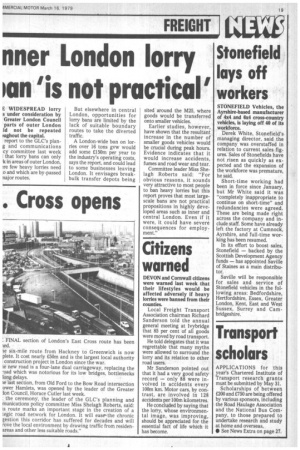nner London lorry an 'is not practical'
Page 21

If you've noticed an error in this article please click here to report it so we can fix it.
E WIDESPREAD lorry s under consideration by Greater London Council parts of outer London Id not be repeated oughout the capital.
report to the GLC's plang and communications cy committee last week [ that lorry bans can only k in areas of outer London, we few heavy lorries need o and which are by-passed najor routes. But elsewhere in central London, opportunities for lorry bans are limited by the lack of suitable boundary routes to take the diverted traffic.
A London-wide ban on lorries over 16 tons gvw would add some £150m per year to the industry's operating costs, says the report, and could lead to some businesses leaving London. It envisages breakbulk transfer depots being sited around the M25, where goods would be transferred onto smaller vehicles.
Earlier studies, however, have shown that the resultant increase in the number of smaller goods vehicles would be crucial during peak hours. Evidence indicates that it would increase accidents, fumes and road wear and tear.
Committee leader Miss Shelagh Roberts said: "For obvious reasons, it sounds very attractive to most people to ban heavy lorries but this report proves that most largescale bans are not practical propositions in highly developed areas such as inner and central London. Even if it were, it could have severe consequences for employment."
























































































































































